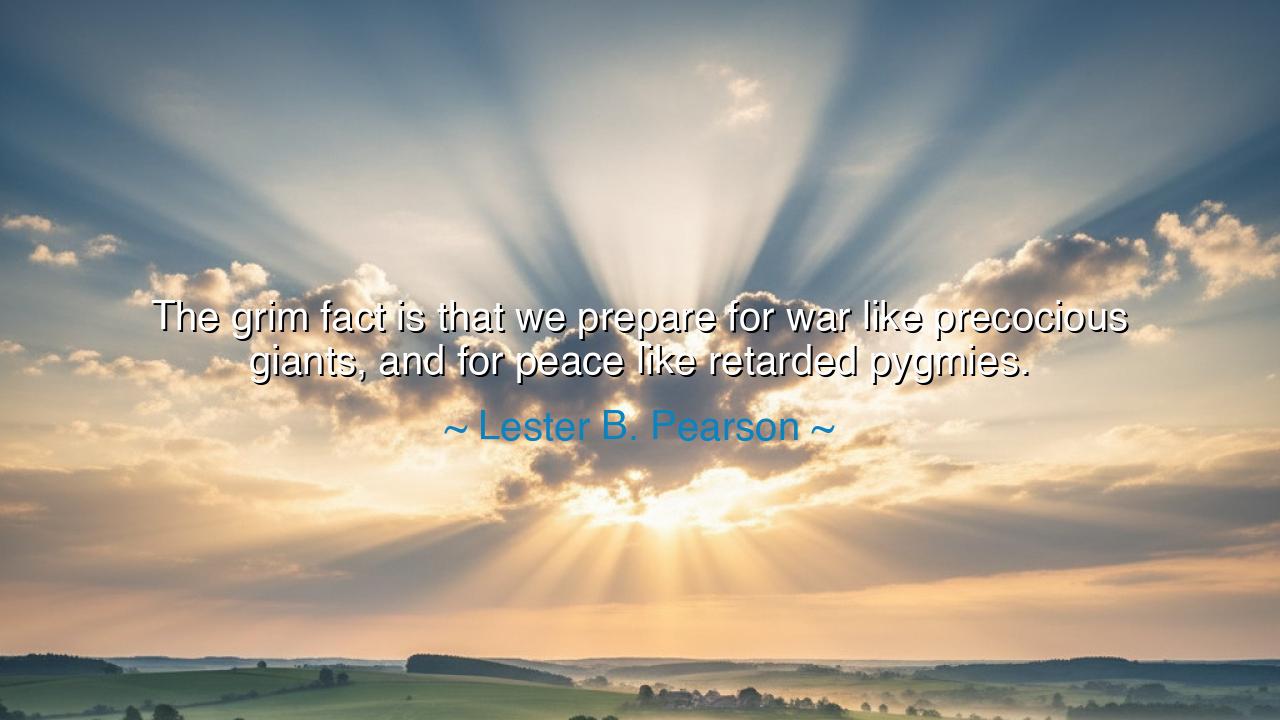
The grim fact is that we prepare for war like precocious giants
The grim fact is that we prepare for war like precocious giants, and for peace like retarded pygmies.






The words of Lester B. Pearson—“The grim fact is that we prepare for war like precocious giants, and for peace like retarded pygmies.”—thunder with a sorrowful truth. They reveal the tragedy of humanity’s priorities: how we marshal our genius, our wealth, our strength, and our very souls in the service of war, yet stumble weakly, childishly, when called to the labor of peace. Here is the great irony of our kind: we build weapons that could shatter the world, yet struggle to build trust that might save it.
To be likened to precocious giants in war is to be seen as strong beyond measure, clever beyond our years. Nations call upon their brightest minds, their deepest coffers, their mightiest industries, and their fiercest hearts to devise the arts of destruction. The fire of invention blazes, new engines of power are forged, and whole societies bend themselves toward victory. This has ever been the way: Rome perfected the legion, Europe the cannon, and our modern age the nuclear bomb. In war, humanity reveals its genius—terrible, awe-inspiring, but genius nonetheless.
But when Pearson declares we approach peace like retarded pygmies, he laments how small and feeble we become when asked to forge harmony instead of destruction. Where war summons the full vigor of nations, peace receives only their scraps—negotiations delayed, half-hearted treaties, shallow gestures. Rarely do we summon the same brilliance for reconciliation as we do for conquest. Our hands that can craft machines of war with precision tremble clumsily when tasked with building structures of trust. This imbalance, Pearson warns, is not merely shameful—it is catastrophic.
History testifies to this imbalance with sorrowful clarity. After the First World War, nations gathered at Versailles not with the imagination of giants but with the shortsightedness of pygmies. They imposed penalties, sowed resentment, and failed to build a foundation for true peace. The result was predictable: within a generation, the world burned again. By contrast, after the Second World War, leaders at last learned a measure of Pearson’s wisdom. Through the Marshall Plan, through the creation of the United Nations, through institutions of cooperation, they invested not only in punishment but in peace. Though imperfect, these efforts brought decades of stability and spared humanity another global cataclysm.
And who was Pearson himself? Not merely a critic, but a builder. A Canadian diplomat and later Nobel laureate, he became the father of modern peacekeeping, helping to resolve the Suez Crisis of 1956 not with bombs, but with dialogue and the creation of international peace forces. His life itself embodied his words: he saw the giant’s strength that nations poured into war, and he dared to channel that strength into peace. His legacy stands as proof that peace, too, requires genius, vision, and courage—no less than war.
The lesson for us, children of today, is clear: peace must be prepared with the same vigor as war. If we give our minds, our resources, our labor to conflict, and only our leftovers to reconciliation, then conflict will ever return. But if we pour into peace the same brilliance, sacrifice, and resolve, then peace can endure. Peace is not weakness—it is the greater work, for it demands not only courage but also patience, humility, and imagination.
Practically, this means cultivating the habits of peace in every sphere of life. In nations, it means investing in diplomacy as earnestly as in defense. In communities, it means working to reconcile divisions rather than inflame them. And in our own hearts, it means resisting the ease of anger and vengeance, choosing instead the harder labor of forgiveness and understanding. For peace begins not only in treaties, but in the daily choices of ordinary souls.
So let Pearson’s words ring in your spirit: “We prepare for war like giants, but for peace like pygmies.” Do not be a pygmy in peace. Be a giant—pour your full strength into the labor of harmony. For only when peace receives the same devotion as war will humanity rise from its tragic cycle and walk at last into the dawn of its greater destiny.






AAdministratorAdministrator
Welcome, honored guests. Please leave a comment, we will respond soon